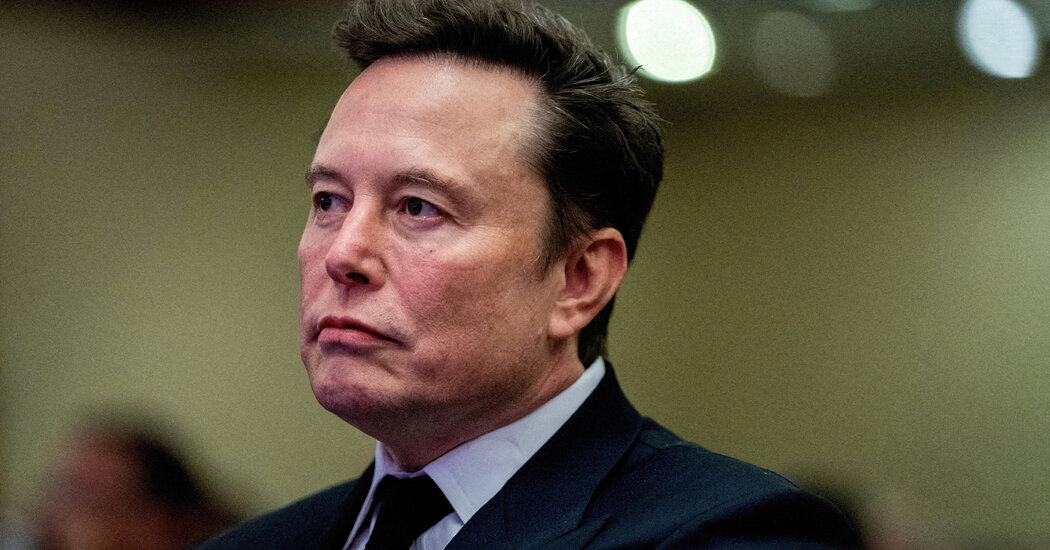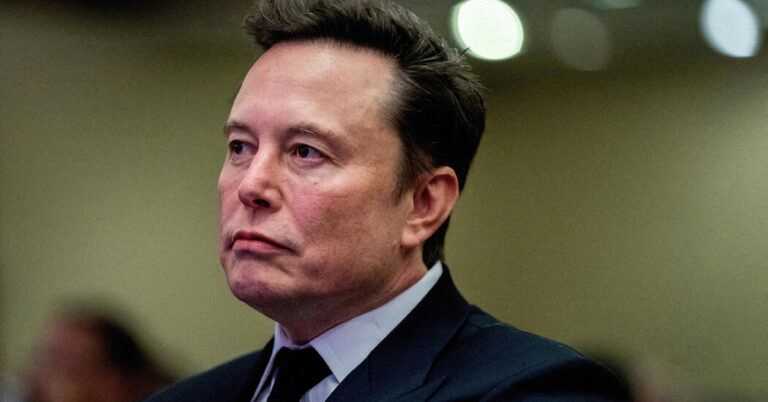U.S. securities regulators sued Elon Musk in federal court in Washington on Tuesday in an enforcement action stemming from his $44 billion purchase of Twitter, now called X.
The lawsuit against Musk, who has become a close adviser to President-elect Donald J. Trump, is likely to be one of the Securities and Exchange Commission’s most controversial final acts under Gary Gensler, its outgoing chairman. It could also be reduced in a matter of days, when Trump appoints new leadership to take over the regulator.
The SEC alleges that by purchasing Twitter in 2022, Musk violated securities laws by amassing a large stock position in the social media company without filing the proper notification. The complaint stated that he waited 11 days before making the required disclosure to the SEC
Regulatory documentation is necessary so that investors in the market can monitor the moves of large investors and potential takeover offers.
Because Musk did not disclose his position, he was able to continue buying Twitter shares at an artificially low price, the SEC said in its lawsuit. The move “allowed him to underpay by at least $150 million” for the additional shares before belatedly disclosing his stake, the lawsuit continues.
In recent weeks, Musk had taunted the SEC in posts on X about the possibility of filing a lawsuit. In December he shared a letter that his lawyer, Alex Spiro, sent to the agency, rejecting a settlement offer in the case.
On Tuesday, Spiro denounced the regulator’s latest filing.
“Today’s action is an admission by the SEC that it cannot pursue a real case, because Mr. Musk has done nothing wrong and everyone sees this farce for what it is,” Spiro said in a statement . The agency had conducted a “multi-year campaign of harassment” against Musk, but filed “a single-count complaint,” Spiro added.
This is the third time the SEC has gone to court with Musk. The first lawsuit, during Trump’s first term, arose from inappropriate, market-influencing social media posts in which Musk mused about taking his electric car company, Tesla, private.
Before filing the lawsuit Tuesday, the SEC had also sought to force Musk to comply with a subpoena aimed at obtaining his deposition.
With Gensler’s resignation coinciding with Trump’s inauguration on Monday, it is unclear whether the new regulators will pursue the litigation. The president-elect has said he plans to nominate Paul Atkins, a former SEC commissioner and pro-business conservative, to succeed Gensler.
Daniel Richman, a professor at Columbia Law School who specializes in criminal law, said the lawsuit appears to be part of a pattern of matters filed by Biden administration appointees “ending its way.”
It will be up to the new administration and Trump appointees to decide whether to “back down and drop” cases like the one against Musk, he said.
The SEC and the Consumer Financial Protection Bureau filed a series of lawsuits in the final days of the Biden administration. As in the case against Musk, it’s unclear how these last-minute actions will fare under the new administration.
Dennis Kelleher, CEO of Better Markets, a nonprofit group that pushes for greater transparency on Wall Street, said the timing of the lawsuit may have been dictated by Musk’s resistance to the SEC’s effort to take a deposition. Mr Kelleher said most cases like this would be resolved with the defendant paying a fine and without admitting or denying liability.
The SEC, he said, is sending the message that “billionaires engaged in legal wars will respect the law like every other American.”
However, the SEC hasn’t gone out of its way to trumpet the lawsuit.
Regulators filed it Tuesday after businesses closed on the East Coast without the usual fanfare associated with a big case. The press release announcing the filing did not include a quote from Mr. Gensler or any other top agency official — a rarity for an action against a high-profile businessman.
It was an indication that regulators may be concerned about the prospect of going after the richest person on the planet, who is also a close adviser to the president-elect, less than a week before Inauguration Day.
Mr Musk has been at Mr Trump’s side almost every day since the presidential election. He lives almost full-time at Trump’s Mar-a-Lago residence and club in Florida, and attends meetings and events with the president-elect.
Trump also named Musk co-chair of a government task force that aims to find ways to cut the federal budget.
The SEC has been pursuing its current investigation into Musk for years, which began shortly after he announced in April 2022 that he had amassed a controlling stake in Twitter.
Musk began buying Twitter shares in late January 2022. In February, the broker handling his stock purchases warned the billionaire’s chief financial officer that Musk would need to seek legal advice to disclose his position, according to the lawsuit regulator. In mid-March, Musk crossed the 5% ownership threshold, the point at which public disclosure is required.
He continued to buy shares on Twitter and did not disclose his holding until April 4, the SEC said in its complaint. After announcing its position, Twitter shares rose more than 27%.
Although Musk initially said in an SEC filing that he intended to become a passive shareholder of Twitter, he quickly changed direction and made an offer to buy it outright for $44 billion. In July 2022, he attempted to back out of the purchase, but the company sued to force the deal. Mr. Musk completed his purchase in October and later changed the company’s name to X.
The SEC has been fighting Mr. Musk to compel his testimony in the case. In October 2023, the agency subpoenaed him in an attempt to force him to testify about his stock purchases. Mr Musk appeared to testify a year later. The billionaire also agreed to pay nearly $3,000 to reimburse the SEC for travel expenses incurred in sending his employees to take his testimony.
But in November, a federal judge in San Francisco denied the SEC’s request to impose sanctions on Musk. The next day, in a post on X, Musk taunted the agency with a vulgar joke.
Musk’s acquisition of Twitter has been the subject of numerous lawsuits and investigations by federal authorities. The Federal Trade Commission investigated whether X had the resources to protect user privacy after it fired much of its staff and after several senior executives responsible for privacy and security resigned.
That agency also sought to depose Mr. Musk. Former Twitter shareholders have also sued Musk, accusing him of fraud in a case related to his late disclosure of his stake in the company.
Alain Delaquérière contributed to the research.





